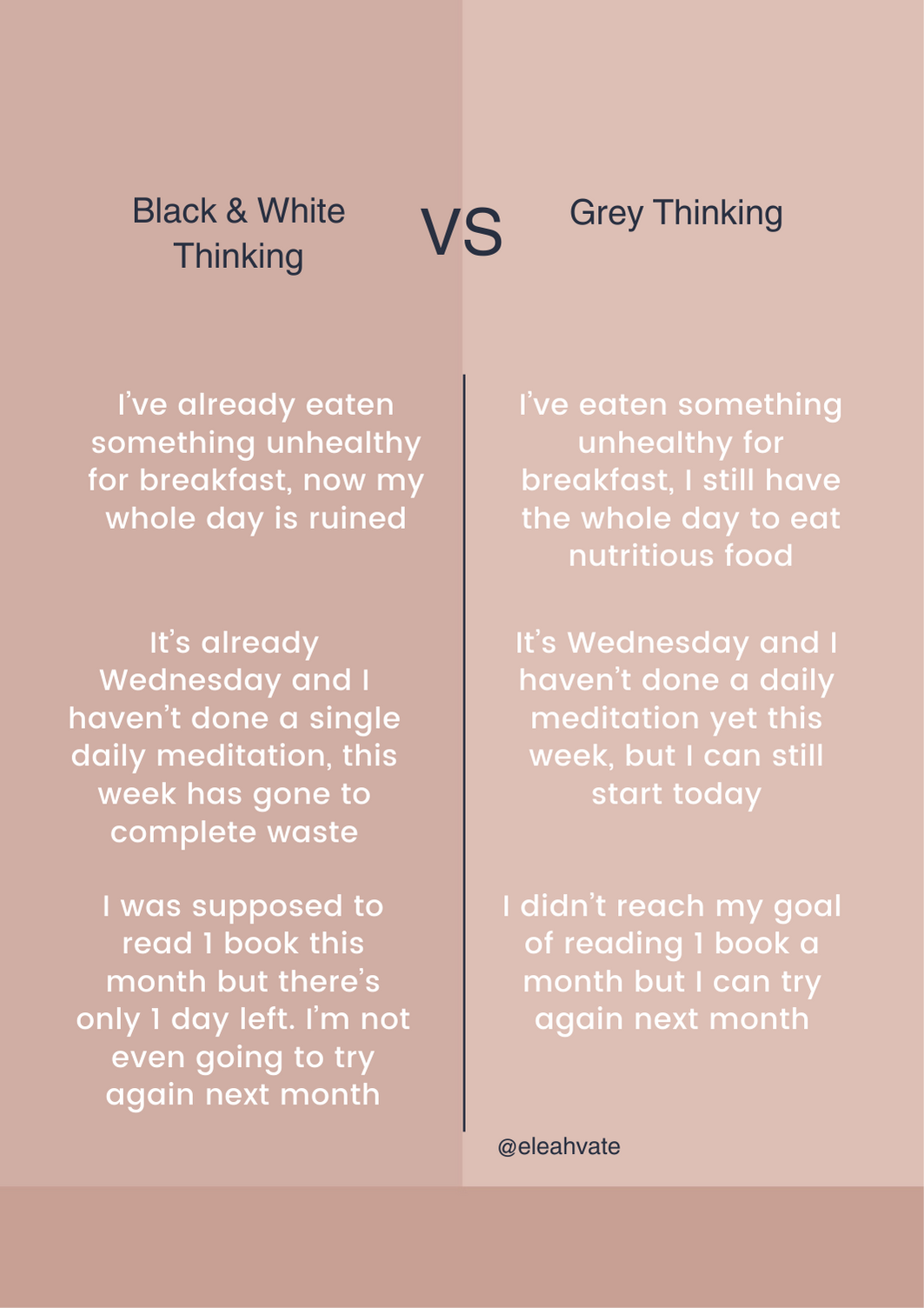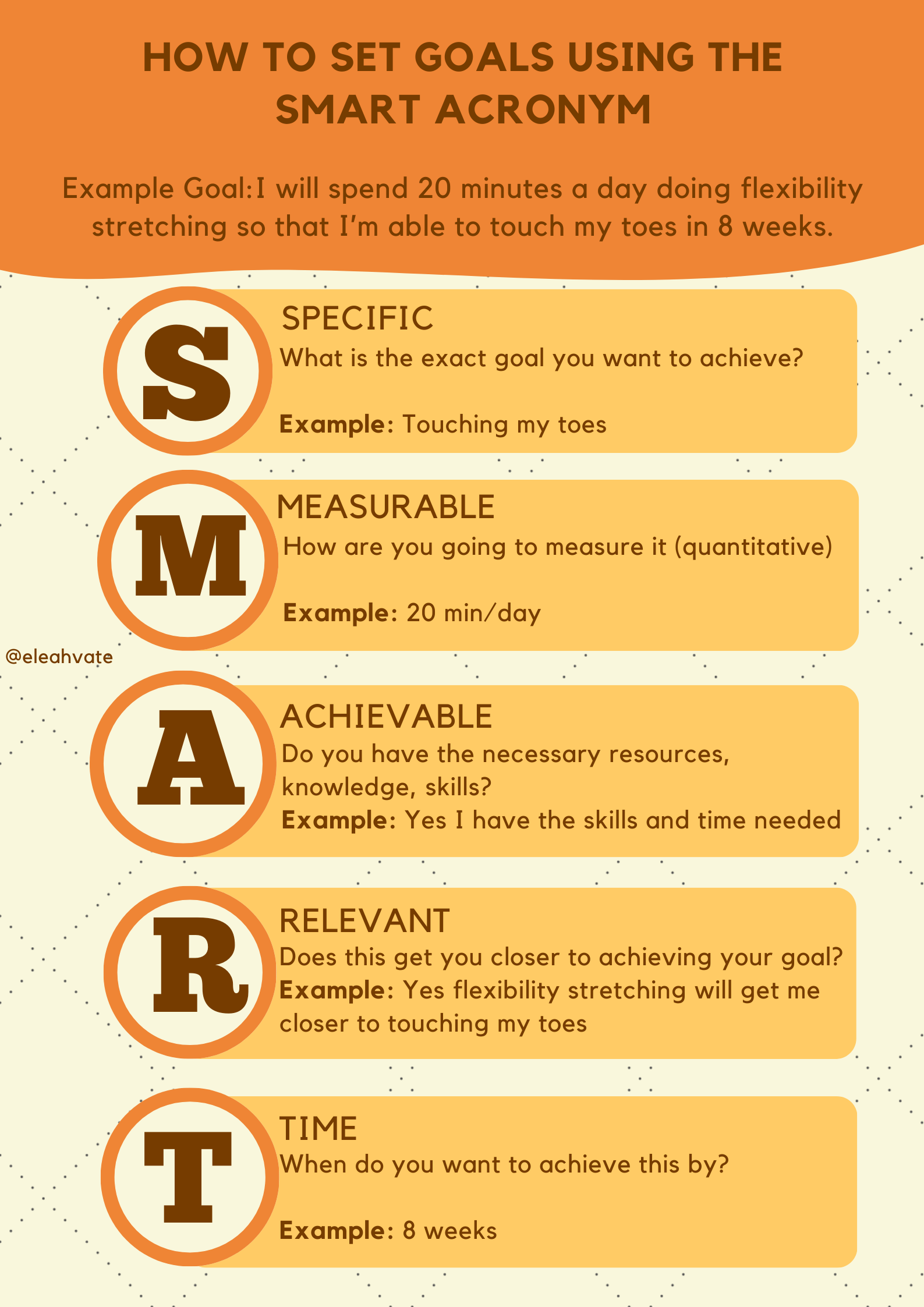How to Create Habits That Will Stick in 2024
Welcome to your Eleahvate post of the week everyone!
It is already mid January and by now a lot of people have set their resolutions for the year.
This is a prime time for people (including myself) to reflect on what healthy habits they want to adopt and carry on throughout the new year.
But it’s very easy to be at an all time high with motivation and then once you have been inconsistent, you abandon the goal altogether.
Then you may find yourself in the position where you’ve already told yourself that you don’t have what it takes to push through the challenges and achieve your goal.
But we are not going to carry on with this mentality ok??
Today we’re going to talk about how to tweak your mindset and how to create habits that you can actually stick to!
Break up with the idea that your goals are something you “arrive at” and instead focus on the systems you create around your goals
We’ve all heard before that it’s about the process and not the outcome.
But adopting this mindset is truly the difference between achieving your goals and remaining stagnant.
It’s so easy to get caught up in how long it is taking to reach your specific goal.
But I challenge you to allow yourself the space to grasp all of the lessons you’re meant to learn along the way.
Give yourself the space to really ask yourself what these challenges are trying to teach you.
And I promise you will come out with more than just your achieved goal.
Leave the “all or nothing” “black or white” thinking in 2023
This can be such a hindrance because the second that we notice ourselves being inconsistent we quit.
This type of thinking allows yourself no grace, no room to improve, and it simply demands perfection.
We reprogram our beliefs to “well if I missed 2/5 gym sessions this week, I’m an imposter/I’ve failed/I’m inconsistent and I don’t have what it takes to stay consistent”
Challenge yourself to not let one action define your entire character.
Wouldn’t it be more powerful to think “I’ve missed 2/5 sessions this week, but I’m still committed to attending the remaining 3 because I won’t give up on myself”
Once you set your goal, start with the smallest, most easiest step you can implement today and focus how to build on that
Sometimes when we plan out our goals we have big expectations for ourselves.
There is no problem with having high expectations for yourself but if they are so high that the starting point seems unrealistic, you don’t want this to get in the way of you making a true effort.
Therefore if your goal is to workout for 1 hour for 5 days/week, perhaps starting with simply getting to the gym in the first place and just stretching would be your first small step.
Even if you don’t do a full workout, the act of you getting there is so important.
Whatever the smallest step is for you, implement that. No step is too small and every step is significant.
Expect that not everything will go as planned
I believe that if we enter a goal with the mindset that everything will go as planned, we are doing ourselves a disservice.
The whole point of goal setting is to build skills or habits to elevate you to a position you haven’t been in or are trying to improve in.
In doing that, it would be fair to assume that we are going to face obstacles and challenges along the way.
Sometimes these challenges may derail us completely and we may take this as a sign that that we’re not meant to be on this path.
I encourage you to take it as a reminder that you are resilient and that these are serving as points to strengthen your “why.”
Use the SMART acronym to set your goals
Whenever you are setting a goal use this acronym as it gives you a clear path on how to achieve your goals.
The SMART acronym can be used to achieve your overall goal or if you need to break up your bigger goal into smaller ones.
I’ve found it very helpful to be able to look back at my specific efforts and notice where I may’ve went wrong.
It’s also beneficial to be able to pinpoint where I’m taking actionable steps so I can track my progress.
When thinking about why you want to achieve your goal- think about who you want to become vs what you will attain
If you find a surface level reason to attain something, chances are your adherence to the goal won’t be as strong because you may not connect to it.
Or if you eventually attain your goal you may not stick with it because it was never that deep for you to begin with.
For example…
When I started to take my diet more seriously I connected my reasons to eat in a more healthy way to:
being someone who can live a long and healthy life
being someone who has more energy throughout the day
being someone who actually cares about my health from the inside out
Being able to identify these reasons has allowed me to maintain this goal long term rather than have it be something I intermittently desire.
Cue, Craving, Response, Reward
When you are developing a new habit and are trying to find ways of implementing it, think of it in this order.
Author James Clear talks about this in his popular book Atomic Habits.
This illustration shows the cycle you go through but one thing that stood out the most is if I want to create a new habit, it needs to be easy and accessible to begin with.
For example, when I wanted to start going to the gym regularly I had a membership but it was far from my house.
Initially I thought the desire (craving) to go would be enough motivation to get me there, but with the gym being so far this never allowed me to progress to the response step of the cycle which therefore never amounted to the reward.
I think I had that membership for a year y’all and I probably went less than 10 times.
Now that I go somewhere closer to me and it’s more accessible, I’m able to go through all of the stages of habit formation.
Don’t try to implement too many goals at once
I’ve done this too many times to count but when I have so many new habits I’m excited about implementing, I try to tackle them all at the same time.
This usually leads me to being overwhelmed and scrapping the new habits completely because I feel like I’ve failed at my attempt.
Now I will pick no more than 2-3 habits at a time and using all of my tips in this post I will slowly implement them.
This allows me to be intentional and go through all of the stages of habit formation.
I want to hear from you!
With any new goal I find it easy to get lost in the excitement of it all because deep down it feels good to take charge and change your habits.
I’ve used these tips over the span of a year and they’ve really helped me redefine my sense of consistency and I’ve found myself way more successful in making new habits stick.
These tips are also not limited to “new years goals” they should be used at any time you are trying to form a new habit!
I would love to hear:
What is one goal you have for yourself?
What is the most helpful strategy you use to creating new habits?
Thank you all for taking the time to read my post and I’ll see you in the next one!
With love,
Leah
Stay connected with me on my socials!
Instagram: @eleahvate
Pinterest: @eleahvate



